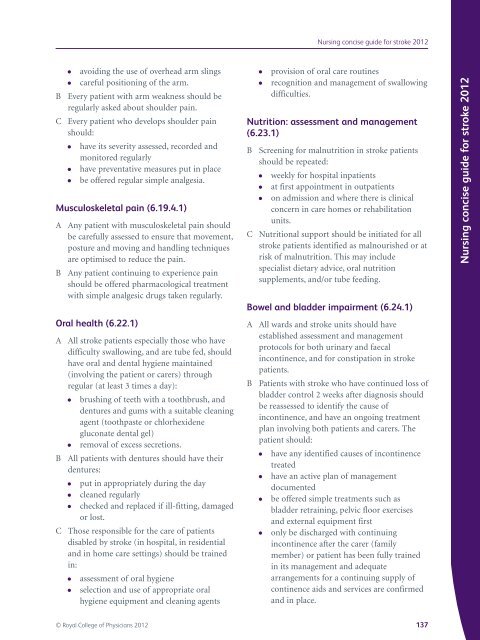national-clinical-guidelines-for-stroke-fourth-edition
national-clinical-guidelines-for-stroke-fourth-edition
national-clinical-guidelines-for-stroke-fourth-edition
Create successful ePaper yourself
Turn your PDF publications into a flip-book with our unique Google optimized e-Paper software.
● avoiding the use of overhead arm slings<br />
● careful positioning of the arm.<br />
B Every patient with arm weakness should be<br />
regularly asked about shoulder pain.<br />
C Every patient who develops shoulder pain<br />
should:<br />
● have its severity assessed, recorded and<br />
monitored regularly<br />
● have preventative measures put in place<br />
● be offered regular simple analgesia.<br />
Musculoskeletal pain (6.19.4.1)<br />
A Any patient with musculoskeletal pain should<br />
be carefully assessed to ensure that movement,<br />
posture and moving and handling techniques<br />
are optimised to reduce the pain.<br />
B Any patient continuing to experience pain<br />
should be offered pharmacological treatment<br />
with simple analgesic drugs taken regularly.<br />
Oral health (6.22.1)<br />
A All <strong>stroke</strong> patients especially those who have<br />
difficulty swallowing, and are tube fed, should<br />
have oral and dental hygiene maintained<br />
(involving the patient or carers) through<br />
regular (at least 3 times a day):<br />
● brushing of teeth with a toothbrush, and<br />
dentures and gums with a suitable cleaning<br />
agent (toothpaste or chlorhexidene<br />
gluconate dental gel)<br />
● removal of excess secretions.<br />
B All patients with dentures should have their<br />
dentures:<br />
● put in appropriately during the day<br />
● cleaned regularly<br />
● checked and replaced if ill-fitting, damaged<br />
or lost.<br />
C Those responsible <strong>for</strong> the care of patients<br />
disabled by <strong>stroke</strong> (in hospital, in residential<br />
and in home care settings) should be trained<br />
in:<br />
● assessment of oral hygiene<br />
● selection and use of appropriate oral<br />
hygiene equipment and cleaning agents<br />
Nursing concise guide <strong>for</strong> <strong>stroke</strong> 2012<br />
● provision of oral care routines<br />
● recognition and management of swallowing<br />
difficulties.<br />
Nutrition: assessment and management<br />
(6.23.1)<br />
B Screening <strong>for</strong> malnutrition in <strong>stroke</strong> patients<br />
should be repeated:<br />
● weekly <strong>for</strong> hospital inpatients<br />
● at first appointment in outpatients<br />
● on admission and where there is <strong>clinical</strong><br />
concern in care homes or rehabilitation<br />
units.<br />
C Nutritional support should be initiated <strong>for</strong> all<br />
<strong>stroke</strong> patients identified as malnourished or at<br />
risk of malnutrition. This may include<br />
specialist dietary advice, oral nutrition<br />
supplements, and/or tube feeding.<br />
Bowel and bladder impairment (6.24.1)<br />
A All wards and <strong>stroke</strong> units should have<br />
established assessment and management<br />
protocols <strong>for</strong> both urinary and faecal<br />
incontinence, and <strong>for</strong> constipation in <strong>stroke</strong><br />
patients.<br />
B Patients with <strong>stroke</strong> who have continued loss of<br />
bladder control 2 weeks after diagnosis should<br />
be reassessed to identify the cause of<br />
incontinence, and have an ongoing treatment<br />
plan involving both patients and carers. The<br />
patient should:<br />
● have any identified causes of incontinence<br />
treated<br />
● have an active plan of management<br />
documented<br />
● be offered simple treatments such as<br />
bladder retraining, pelvic floor exercises<br />
and external equipment first<br />
● only be discharged with continuing<br />
incontinence after the carer (family<br />
member) or patient has been fully trained<br />
in its management and adequate<br />
arrangements <strong>for</strong> a continuing supply of<br />
continence aids and services are confirmed<br />
and in place.<br />
© Royal College of Physicians 2012 137<br />
Nursing concise guide <strong>for</strong> <strong>stroke</strong> 2012


